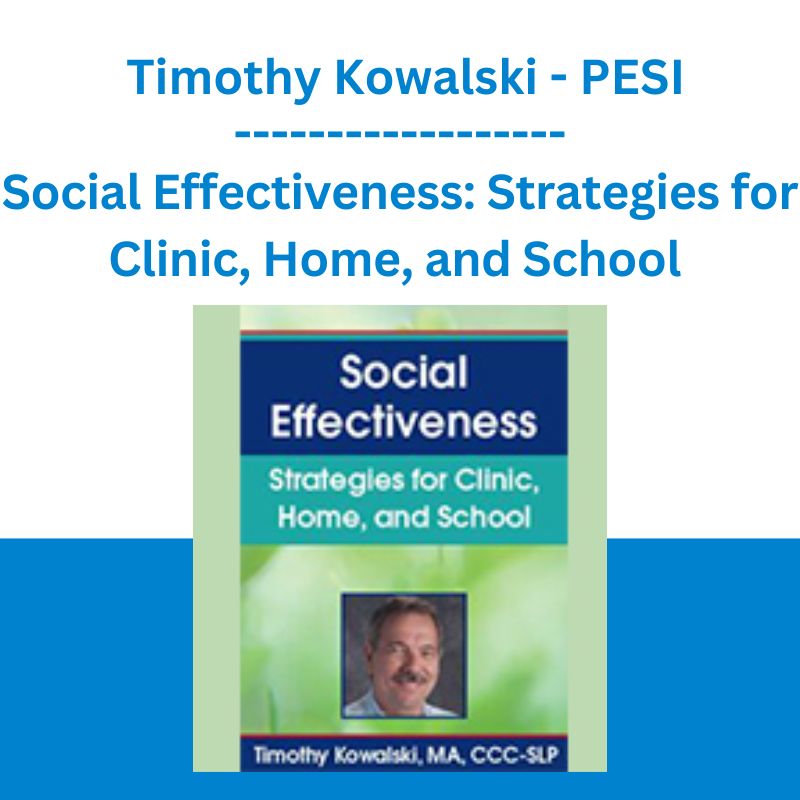*** Proof of Product ***
Exploring the Essential Features of “Social Effectiveness: Strategies for Clinic, Home, and School – Timothy Kowalski – PESI”
Imagine going through life being criticized, punished, and/or ostracized by others for your social blunders.
You think you are interacting just like everyone else, but no one tells you exactly what you did that was offensive. The stress, anxiety, self-doubt, and poor self-esteem you develop only leads to more problems, being more socially inappropriate, insubordinate, or disobedient. It’s our job as therapists to help these individuals understand the problem. But how do we provide meaningful intervention that creates positive change in their social acceptance?
In this presentation, Tim Kowalski, MA, CCC-SLP, will provide meaningful, evidence-based strategies designed to address the deficits related to the core foundations of social skills, including:
- Poor perspective-taking, imaginative play, cognitive thinking
- Hyperliteral, “Argumentative”, misinterpretation
- Difficulty planning, problem-solving, flexible thinking
- Naïveté, poor play skills, obsessive interests
- Pedantic speech, difficulty with conversation, poor nonverbal communication
- Easily stressed, anxious, ritualistic
Finish this session knowing how to skillfully apply treatment strategies to produce positive change at home, school, clinic and office!
Speaker
Timothy P. Kowalski, M.A., CCC-SLP, is a licensed speech-language pathologist specializing in social-pragmatic communication deficits and internationally known expert on Asperger Syndrome. His Orlando practice has seen clients from Europe, South America and throughout the USA. Mr. Kowalski regularly consults to schools on best practices for students identified or suspected of having Asperger’s syndrome and provides schoolwide district inservices.
Mr. Kowalski presents internationally on a wide variety of issues relative to Asperger’s, is a guest lecturer at universities and colleges and is a consultant for forensic cases involving Asperger’s syndrome. He has worked in a variety of psychiatric healthcare delivery systems including in-patient and outpatient psychiatric hospitals, sex offender units, and school-based settings. Mr. Kowalski is the author of six books on Asperger syndrome: Asperger Syndrome Explained; Social-Pragmatic Success for Asperger Syndrome and Other Related Disorders; Are You In The Zone?; The Source for Asperger’s Syndrome; Me, Myself, and You; Understanding Emotions: A Guide for Adults; and an article entitled Assessing Social Communication in Asperger Syndrome.
He holds the position of vice president of professional practices in speech-language pathology for the Florida Speech-Language-Hearing Association and is also a member of the American Speech-Language-Hearing Association, Autism Society of America, Council for Behavior Disorders, and the Council for Exceptional Children. Mr. Kowalski is the recipient of the “2010 Clinician of the Year Award” offered by the Florida Association of Speech- Language Pathologists and Audiologists and the 2011 FLASHA nominee for the ASHA Louis M. di Carlo Award for Recent Clinical Achievement. He holds the “TEAMS 2000 Speech-Language Pathologist of the Year” award for his work with Autism in the four-countywide greater Orlando, Florida metropolitan area and has served on the board of directors for the Greater Orlando Chapter of the Autism Society of America.
Speaker Disclosures:
Financial: Timothy Kowalski is the President of Professional Communication Services, Inc. He receives royalties as a published author. He receives a speaking honorarium and recording royalties from PESI, Inc. He has no relevant financial relationships with ineligible organizations.
Non-financial: Timothy Kowalski is a member of the American Speech-Language-Hearing Association, the Inter-American Teacher Education Network and the Florida Association for Speech-Language Pathologists and Audiologists.
Objectives
- Articulate the signs attributed to foundational deficits in Theory of Mind, Central Coherence, and Executive Function.
- Implement treatment strategies designed to improve cognitive thinking, misinterpretation, and poor planning.
- List the signs of deficiencies in your client’s social interaction, social communication, and social regulation.
- Design treatment strategies to improve play skills, pedantic speech, and anxiety.
Outline
THE “ROOTS OF SOCIAL SKILLS”: IF THE ROOTS AREN’T VIABLE, THE TREE WON’T SURVIVE
Theory of Mind
- Treatment for: Poor perspective taking, imaginative play, cognitive thinking
- Strategies:
The Zone (Kowalski, 2010)
Comic Strip Conversations and Social Stories
Barrier and detective games
Central Coherence: Seeing the Forest Through the Trees
- Treatment for: Hyperliteral, “Argues”, misinterpretation
- Strategies:
Loosey-Goosey Language
Cognitive flexibility
Big Picture
Executive Functions (EF): Tools for Executive Function Deficits
- Treatment for: Poor planning, problem solving, flexible thinking
- Strategies:
Imitation
Contingency statements
Stroop-like tasks
THE SOCIAL TRIAD
Social Interaction
- Treatment for: Naïve, poor play skills, obsessive interests
- Strategies:
Structured play groups
Social autopsies
Social cause-effect
Social Communication
- Treatment for: Pedantic speech, difficulty with conversation, poor nonverbal communication
- Strategies:
Visual strategies
Grice’s Maxims
Expansion and Repair
Social-Emotional Regulation and Emotional Intelligence: EQ
- Treatment for: Easily stressed, anxious, ritualistic
- Strategies:
Recognizing emotions in yourself and others (prosopagnosia)
Language of emotions (alexithymia)
Forget About It Box
Target Audience
- Speech-Language Pathologists
- Therapists
- Psychologists
- Mental Health
- Social Workers
- Teachers
- Occupational Therapists
- Physical Therapists
Please see the full list of alternative group-buy courses available here: https://lunacourse.com/shop/










 Julie Stoian & Cathy Olson - Launch Gorgeous - Funnel Gorgeous Bundle
Julie Stoian & Cathy Olson - Launch Gorgeous - Funnel Gorgeous Bundle  Fred Haug - Virtual Wholesaling Simplified
Fred Haug - Virtual Wholesaling Simplified  Ed Ponsi - Forex Trading
Ed Ponsi - Forex Trading  Team NFT Money - Ultimate NFT Playbook
Team NFT Money - Ultimate NFT Playbook  The Daily Traders – Exclusive Trading Mentorship Group
The Daily Traders – Exclusive Trading Mentorship Group  Trade Like Mike - The TLM Playbook 2022
Trade Like Mike - The TLM Playbook 2022  Dave Landry - Stock Selection Course
Dave Landry - Stock Selection Course  Greg Loehr - Advanced Option Trading With Broken Wing Butterflies
Greg Loehr - Advanced Option Trading With Broken Wing Butterflies  Emanuele Bonanni - My Trading Way
Emanuele Bonanni - My Trading Way  George Fontanills & Tom Gentile - Optionetics 6 DVD Series Home Study Course (Digital Download)
George Fontanills & Tom Gentile - Optionetics 6 DVD Series Home Study Course (Digital Download)  Alphashark - The AlphaShark SV-Scalper
Alphashark - The AlphaShark SV-Scalper  Erik Banks - Alternative Risk Transfer
Erik Banks - Alternative Risk Transfer  SMB - Options Training
SMB - Options Training  Jesse Livermore Trading System - Joe Marwood
Jesse Livermore Trading System - Joe Marwood  Chris Capre - Advanced Price Action Ongoing Training & Webinars
Chris Capre - Advanced Price Action Ongoing Training & Webinars  George Fontanills & Tom Gentile - Optionetics Wealth Without Worry Course
George Fontanills & Tom Gentile - Optionetics Wealth Without Worry Course  Money Miracle - George Angell - Use Other Peoples Money To Make You Rich
Money Miracle - George Angell - Use Other Peoples Money To Make You Rich  Chelsea Guerrero - The Scalp University 2023
Chelsea Guerrero - The Scalp University 2023  Gold Minds, Dimitri Wallace - Global 5 Day Program
Gold Minds, Dimitri Wallace - Global 5 Day Program  Racing Workshop - Complete Online Package
Racing Workshop - Complete Online Package  Matthew Kratter - Trader University
Matthew Kratter - Trader University  Crypto Dan - The Crypto Investing Blueprint To Financial Freedom By 2025
Crypto Dan - The Crypto Investing Blueprint To Financial Freedom By 2025  TJ Walker & Media Training Worldwide Digital - Media Training - You Can Be a Media Trainer
TJ Walker & Media Training Worldwide Digital - Media Training - You Can Be a Media Trainer  Michelle Schubnel - Group Coaching Success Home Learning 2017
Michelle Schubnel - Group Coaching Success Home Learning 2017